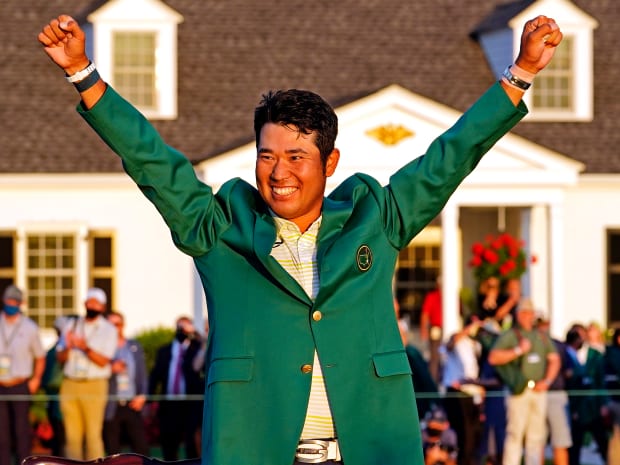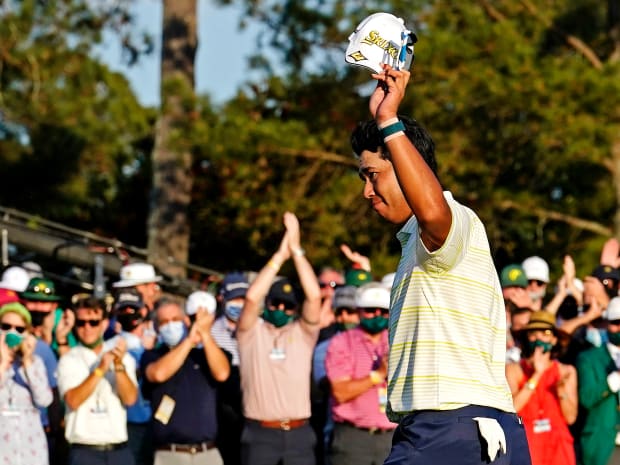Hideki Matsuyama's Masters win was historic and kind of boring. It was, then, exactly how he should have won his first major championship.
Most of Hideki Matsuyama’s Masters-winning round took place in the middle of the night in Japan. And yet, unlike American golf fans, Japanese fans were probably wide awake.
This was historic and kind of boring, meaningful but not particularly entertaining. It was, then, exactly how Matsuyama should have won his first major championship. He is the first Japanese man to win a major, and that is huge news in Japan, a densely populated, golf-crazy archipelago where people think nothing of installing a driving range in the nearest available sliver of land. Matsuyama himself is not known for his on-course charisma. But it is not our job to market him. Today, let’s appreciate him instead.

Picture him last week, arriving at Augusta National: an introvert playing a solitary sport half a world away from where he grew up, nearly four years removed from his last victory. He was once a top-five player in the world. He showed up at the Masters at No. 25. Matsuyama was still very good, but he was really nobody’s pick to win this—not even his own.
Then, on Wednesday, the famously hard-working Matsuyama found something as he hit balls. Sometimes, when a golfer has been great, and knows what being great feels like, that’s all it takes. You find something, or it finds you.
From there, Matsuyama put on one of the most impressive performances in recent Masters history. It might not look like that. Matsuyama finished 10-under par. Runner-up Will Zalatoris was 9-under. But when Dustin Johnson set the Masters scoring record last November, he did so on a soft course that was just not as terrifying as it usually is. This week, Augusta National had all of its teeth. Matsuyama played smart, fearless golf. He took hold of the tournament on Saturday and never let go.
And he did it knowing that, no matter when he last won anything, his country expected him to win. Japan has anticipated this for at least a decade, since Matsuyama was low amateur at the Masters in 2011. Elite Japanese athletes have to deal with obsessive media to remind them of what they mean. Matsuyama had to sleep on the Masters lead, too. Neither affected him a bit.
“I can’t say I’m the greatest” golfer from Japan, Matsuyama said afterward, through his agent and translator, Bob Turner. “However, I’m the first to win a major. If that’s the bar, I set it.”
He had set the bar all weekend. His final margin of victory was one stroke, but it was not nearly that close. Matsuyama planned to get up at 9:30 a.m. Sunday, but he awoke early, couldn’t sleep, and went to the course before he had planned. Then he spent most of Sunday afternoon running out the clock. After some early stumbles, he righted himself and did a brilliant job of avoiding disaster. His driver was as accurate as Bryson DeChambeau’s favorite calculator. He arrived at Amen Corner with a big lead, and he knew exactly what to do with it.
He hit his approach on 11 safely to the right, away from the water. His tee shot on the 12th found the back bunker, which is a lousy place to be, but that’s the charm and challenge of Augusta: The course puts you in difficult spots. From that bunker, Matsuyama hit perhaps his smartest shot of the day, a gentle escape to the fringe. He did not get fooled into worrying about saving par. He surely knew the risks of blasting out of there and rolling into the front bunker or Rae’s Creek. He was playing with house money. He spent one stroke’s worth and walked away with bogey.
His approach on 13 was long, but not too long; he still made birdie. He made par on No. 14. He hit a perfect fade off the 15th tee. It was there that he had his only serious back-nine misadventure.
Matsuyama decided to go for the green in two, which was completely understandable—laying up leaves a difficult wedge shot off a downhill lie, and as Matsuyama said afterward, Xander Schauffele had made three straight birdies to make things moderately interesting. Most Masters collapses occur when a player is tentative. Matsuyama hit his four-iron, but it came out a little low and hot, took a bad bounce, and rolled into the water.
Matsuyama had to drop, but he was savvy and poised again: Gentle chip, two-putt, bogey. The point, remember, was not to shoot 65. It was to avoid disaster.
Matsuyama led Schauffele by two strokes with three to play, and then Schauffele quickly excused himself. He dunked his tee shot and ended up making triple-bogey. Matsuyama’s bogey-par-bogey finish must be viewed through that context. Everything he did was safe. He found the right greenside bunker on 18, but that was better than the left greenside bunker. He gave himself an easy two-putt and easily two-putted. Aggressive swings to conservative targets, again and again.
When he sank the final putt, there was no Tiger-like fist pump or Phil-esque leap in the air. Matsuyama said he felt nothing. It was only when he saw caddie Shota Hayafuji’s joy that the enormity of the moment hit him.

For the rest of his life, nobody in Japan will care that Matsuyama shot a final-round 73 or a back-nine 39 or who finished second. They will remember he earned a green jacket.
Afterward, Matsuyama was asked about possibly lighting the Olympic flame in Tokyo this summer, and he gave the ultimate professional-golfer answer: “It would be quite an honor, but I’m not sure about my schedule.” It doesn’t matter. His country does not need him to go on for hours about how much he loves it. He does not have to be a crossover cultural phenomenon in America. He is, forever, Japan’s first Masters champion.